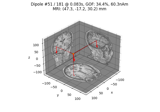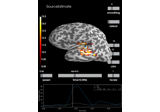mne.inverse_sparse.mixed_norm¶
-
mne.inverse_sparse.mixed_norm(evoked, forward, noise_cov, alpha, loose='auto', depth=0.8, maxit=3000, tol=0.0001, active_set_size=10, debias=True, time_pca=True, weights=None, weights_min=0.0, solver='auto', n_mxne_iter=1, return_residual=False, return_as_dipoles=False, dgap_freq=10, rank=None, pick_ori=None, verbose=None)[source]¶ Mixed-norm estimate (MxNE) and iterative reweighted MxNE (irMxNE).
Compute L1/L2 mixed-norm solution [1] or L0.5/L2 [2] mixed-norm solution on evoked data.
- Parameters
- evokedinstance of
Evokedorlistof instances ofEvoked Evoked data to invert.
- forward
dict Forward operator.
- noise_covinstance of
Covariance Noise covariance to compute whitener.
- alpha
floatinrange[0, 100) Regularization parameter. 0 means no regularization, 100 would give 0 active dipole.
- loose
float| ‘auto’ |dict Value that weights the source variances of the dipole components that are parallel (tangential) to the cortical surface. Can be:
- float between 0 and 1 (inclusive)
If 0, then the solution is computed with fixed orientation. If 1, it corresponds to free orientations.
'auto'(default)Uses 0.2 for surface source spaces (unless
fixedis True) and 1.0 for other source spaces (volume or mixed).
- dict
Mapping from the key for a given source space type (surface, volume, discrete) to the loose value. Useful mostly for mixed source spaces.
- depth
None|float|dict How to weight (or normalize) the forward using a depth prior. If float (default 0.8), it acts as the depth weighting exponent (
exp) to use, which must be between 0 and 1. None is equivalent to 0, meaning no depth weighting is performed. It can also be adictcontaining keyword arguments to pass tomne.forward.compute_depth_prior()(see docstring for details and defaults). This is effectively ignored whenmethod='eLORETA'.Changed in version 0.20: Depth bias ignored for
method='eLORETA'.- maxit
int Maximum number of iterations.
- tol
float Tolerance parameter.
- active_set_size
int|None Size of active set increment. If None, no active set strategy is used.
- debiasbool
Remove coefficient amplitude bias due to L1 penalty.
- time_pcabool or
int If True the rank of the concatenated epochs is reduced to its true dimension. If is ‘int’ the rank is limited to this value.
- weights
None|array|SourceEstimate Weight for penalty in mixed_norm. Can be None, a 1d array with shape (n_sources,), or a SourceEstimate (e.g. obtained with wMNE, dSPM, or fMRI).
- weights_min
float Do not consider in the estimation sources for which weights is less than weights_min.
- solver‘prox’ | ‘cd’ | ‘bcd’ | ‘auto’
The algorithm to use for the optimization. ‘prox’ stands for proximal iterations using the FISTA algorithm, ‘cd’ uses coordinate descent, and ‘bcd’ applies block coordinate descent. ‘cd’ is only available for fixed orientation.
- n_mxne_iter
int The number of MxNE iterations. If > 1, iterative reweighting is applied.
- return_residualbool
If True, the residual is returned as an Evoked instance.
- return_as_dipolesbool
If True, the sources are returned as a list of Dipole instances.
- dgap_freq
intornumpy.inf The duality gap is evaluated every dgap_freq iterations. Ignored if solver is ‘cd’.
- rank
None|dict| ‘info’ | ‘full’ This controls the rank computation that can be read from the measurement info or estimated from the data. See
Notesofmne.compute_rank()for details.The default is None.New in version 0.18.
- pick_ori
None| “normal” | “vector” Options:
NonePooling is performed by taking the norm of loose/free orientations. In case of a fixed source space no norm is computed leading to signed source activity.
"normal"Only the normal to the cortical surface is kept. This is only implemented when working with loose orientations.
"vector"No pooling of the orientations is done, and the vector result will be returned in the form of a
mne.VectorSourceEstimateobject.
- verbosebool,
str,int, orNone If not None, override default verbose level (see
mne.verbose()and Logging documentation for more). If used, it should be passed as a keyword-argument only.
- evokedinstance of
- Returns
- stc
SourceEstimate|listofSourceEstimate Source time courses for each evoked data passed as input.
- residualinstance of
Evoked The residual a.k.a. data not explained by the sources. Only returned if return_residual is True.
- stc
See also
References
- 1
A. Gramfort, M. Kowalski, M. Hämäläinen, “Mixed-norm estimates for the M/EEG inverse problem using accelerated gradient methods”, Physics in Medicine and Biology, 2012. https://doi.org/10.1088/0031-9155/57/7/1937
- 2
D. Strohmeier, Y. Bekhti, J. Haueisen, A. Gramfort, “The Iterative Reweighted Mixed-Norm Estimate for Spatio-Temporal MEG/EEG Source Reconstruction”, IEEE Transactions of Medical Imaging, Volume 35 (10), pp. 2218-2228, 2016.

